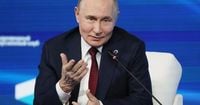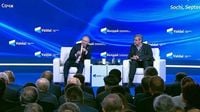Russian President Vladimir Putin has issued a stark warning to the United States, declaring that any decision to supply long-range Tomahawk cruise missiles to Ukraine would mark a dangerous new escalation in the already tense relationship between Moscow and Washington. Speaking at a gathering of foreign policy experts in Sochi on October 2, 2025, Putin underscored that while such a move would inflict damage on Russia, it would not shift the military balance on the ground, where Russian forces, he insisted, are making slow but steady advances.
Putin’s remarks came just days after U.S. Vice President JD Vance confirmed that Washington was considering Ukraine’s request for Tomahawk missiles, a development that has sent ripples through diplomatic and military circles on both sides of the Atlantic. According to Reuters, most of the U.S. Tomahawk stock is already reserved for the American Navy and other needs, raising questions about the feasibility of the transfer. Nonetheless, the Russian leader made it clear that the mere consideration of such a move represents, in his words, a “qualitatively new stage of escalation, including in relations between Russia and the United States.”
“Of course, these missiles can cause us damage,” Putin acknowledged, but he swiftly added, “it will not change the balance of force on the battlefield. Our army continues to advance, slowly but surely.” As reported by the Associated Press, he assured his audience that Russian air defenses would adapt quickly to any new threat posed by the Tomahawks. The White House, for its part, did not immediately respond to requests for comment on Putin’s statements.
While Putin’s tone was combative regarding Ukraine’s Western backers, he struck a markedly different note when discussing his recent interactions with U.S. President Donald Trump. He praised Trump’s efforts to negotiate peace in Ukraine, calling their August 2025 summit in Alaska “productive.” Putin reflected, “It was good that we made an attempt to search for and find possible ways to settle the Ukrainian crisis,” adding that he felt “comfortable” talking to Trump. This blend of flattery and warning was evident throughout his remarks, as he sought to highlight areas of potential cooperation, such as nuclear arms control, while simultaneously drawing red lines on military support for Ukraine.
Putin’s warnings extended beyond missiles. He cautioned Western nations against interfering with Russia’s oil exports, labeling any attempt to seize ships carrying Russian oil as “piracy” that could provoke a military response and destabilize global energy markets. “It’s piracy, and how do you deal with pirates? You destroy them,” Putin said, according to reporting by India Today. He specifically referenced the detention of an oil tanker off France’s Atlantic coast, an incident French President Emmanuel Macron linked to Russia’s so-called “shadow fleet” of older vessels allegedly skirting Western sanctions. Putin dismissed Macron’s accusation as a political diversion, warning, “The risk of confrontation will seriously increase.”
Turning to broader security issues, Putin referenced the New START treaty, the cornerstone of nuclear arms control between the U.S. and Russia, which is set to expire in February 2026. He indicated that Russia is open to extending the treaty, signaling a potential area for renewed dialogue with Washington despite the current tensions.
The Russian president also took aim at Western claims of Russian involvement in recent drone flights over Denmark, casting them as NATO efforts to stoke tensions and justify higher defense spending. With a sardonic grin, he quipped, “I won’t do it anymore — to France, Denmark, Copenhagen, Lisbon — wherever they could reach.” According to the Associated Press, Putin portrayed these allegations as part of a broader campaign by NATO to “inflame tensions to boost the defense spending.”
Amid the geopolitical maneuvering, Putin addressed questions about the assassination of U.S. conservative activist Charlie Kirk. He condemned the killing as a “heinous crime” and claimed it reflected a “deep split” in American society. “Kirk was a hero who died for values Russia also defends,” Putin asserted, drawing a parallel between Kirk and Michael Gloss, an American who joined the Russian military and was killed in action in Ukraine in 2024. Putin said he had posthumously awarded Gloss a medal, which he handed to Trump’s envoy Steve Witkoff during a visit to Moscow. “He gave his life while defending those values as a Russian soldier, and Kirk gave his life while fighting for the same values in the United States,” Putin said, as reported by the Associated Press. The CIA, in response to questions about Gloss, stated, “The agency considers Michael’s passing to be a private family matter — and not a national security issue. The entire CIA family is heartbroken for their loss.”
Putin’s comments come at a time when the Russia-Ukraine conflict shows little sign of abating. Despite the slow pace of Russian advances, Moscow remains adamant that Western military support for Kyiv will not alter the outcome. Nevertheless, the potential supply of Tomahawk missiles, which have a range that could reach deep into Russian territory, has raised fears of a dramatic escalation. According to the Wall Street Journal, the U.S. has also considered providing Ukraine with intelligence on long-range energy infrastructure targets in Russia, potentially enabling Kyiv to strike key infrastructure and deprive Moscow of revenue.
The international community remains divided on how to respond. While some Western leaders argue that increased military support for Ukraine is essential to deter further Russian aggression, others warn that such moves risk drawing NATO and Russia closer to direct confrontation. Putin’s remarks have only heightened these concerns, as he made clear that Russia views certain actions — especially the transfer of advanced weaponry and interference with its energy exports — as crossing red lines that could provoke unpredictable consequences.
As the world watches, the stakes continue to rise. The delicate balance between deterrence and escalation, diplomacy and confrontation, hangs in the balance. Putin’s dual approach — extending praise to Trump while threatening dire consequences for actions he deems hostile — encapsulates the complexity of the current moment. Whether these warnings will temper Western resolve or further entrench divisions remains to be seen, but one thing is certain: the next moves by Washington, Moscow, and their allies will be closely scrutinized by all sides.
In this tense and uncertain environment, the search for common ground, whether on arms control or conflict resolution, appears more urgent than ever — yet also more elusive.


